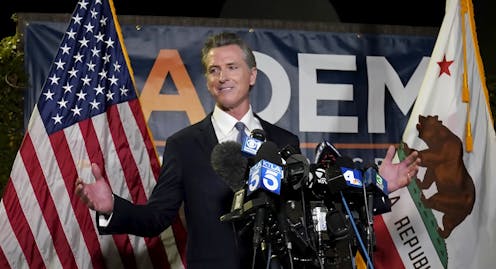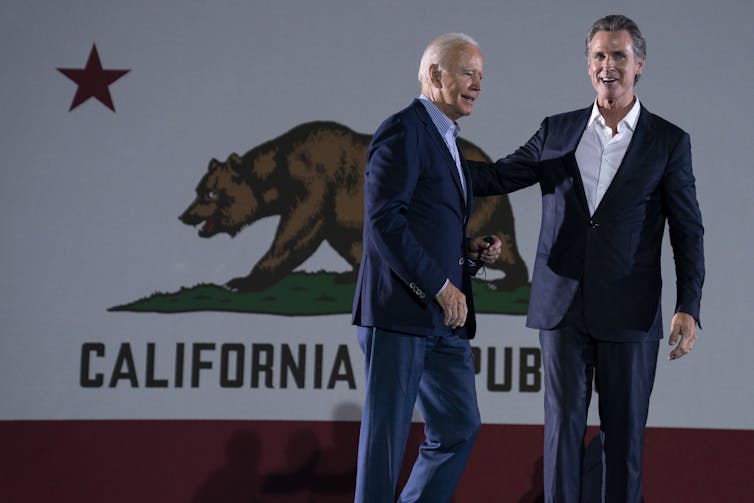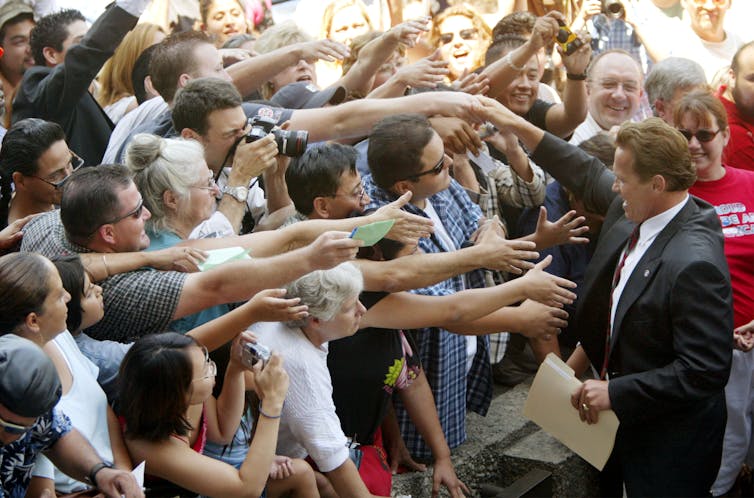California's political standing among Democrats a big winner in Gavin Newsom's recall victory
The state’s Democratic governor held off an attempt to oust him by some margin. His victory provides a pathway for the national party, and a reminder of the mobilizing power of the state.

California Gov. Gavin Newsom emerged from a recall election on Sept. 14, 2021, as the big winner, having secured a heavy majority of the vote. But while most eyes were on the result itself, another important shift was playing out: California’s growing role in national Democratic politics.
President Joe Biden, campaigning for Newsom a day before voting ended, alluded to this shift, telling a friendly crowd: “This is not hyperbole: The eyes of the nation are on California … the decision you’re about to make isn’t just going to have a huge impact on California. It’s going to reverberate around the nation. And quite frankly, it’s not a joke, around the world.”
I’m not sure how great the global impact will be. But as a longtime student of California politics, I am struck by the state’s rising importance in national Democratic politics. It’s a big change.

For many years, California was of secondary importance in the eyes of the party, well behind the narrowly divided “swing states” in the Midwest whose voting proclivities were diced and spliced by campaign strategists. But now, California is being seen as a political barometer for the party in its own right, not just an ATM for visiting national candidates seeking to raise campaign funds.
Once, but no longer a seedbed for Republicans
This change means that Democrats are discovering something that worked for Republicans from the 1960s all the way until the 2000s: They can make California a place where political movements and ideas start and, if successful, spread across the country.
Hard as it may be to believe, given the poor electoral fortunes of California’s Republicans today, the state and particularly the Greater Los Angeles region, were fundamental to the GOP consolidating national power.
Ballot initiatives such as Prop 14 in 1964, which overturned a fair housing law, 1978’s Prop 13, which set off the national tax revolt, and Prop 187, which in 1994 reframed the GOP as anti-immigrant, became symbols of the white backlash that deeply influenced modern Republican politics. The core support for these measures came from Southern California Republicans.
The region was a seedbed for Republican governors, senators and even presidents. Richard Nixon, a House member and then senator, and Ronald Reagan, a two-term governor, won four presidential terms between them. And Pete Wilson, previously a U.S. senator, and George Deukmejian each won the same number of terms as governor.
A path for Biden
Demographic change in California, including the growth in the percentage of Latino and Asian American voters and their mobilization against Republican policies prompted a drastic decline in Republican fortunes in the state, and a major upgrade in Democratic prospects.
By the time Arnold Schwarzenegger ousted Gray Davis in the 2003 recall and was re-elected in 2006, the movie star politician was an anomaly – the last of the Republican breed. No other Republican has won statewide office since.

With growing majorities in the electorate and in the legislature and a near-monopoly of statewide elected offices, California’s Democratic leaders could get out ahead of the national party on issues ranging from immigration to climate change to health care.
California became a powerful ally of the Obama administration, going further on the environment, and demonstrating how the Affordable Care Act could be implemented successfully. During the Trump years, the state often led the resistance on issues such as immigration and climate change – prompting Donald Trump to declare in 2020 that California was “going to hell.”
In the Biden presidency, Newsom showed the way with aggressive steps against COVID-19 that cost him politically in the short term but are paying off with public approval and better, if tentative, outcomes now – a path that the cautious Biden is now treading with his directives on vaccinations.
SoCal, so important
What is even more remarkable is the elevation of Southern California as a state and national player. California Democrats’ presence in national politics has, to date, been through the influence of highly organized and liberal Northern California.
The North showed up once again in the recall, providing a huge margin and high turnout for Newsom. But the big change is in Southern California, which is developing a profile as a Democratic powerhouse. It was not just Los Angeles County that spurned the recall; it also failed in the newly Democratic-leaning counties of Orange and San Diego to the east and south of the LA metropolis.
This region’s politics have drawn interest from national Democrats that was rarely shown in the past. In a Los Angeles City Council election just last year, the two candidates – one drawn from the left wing of the Democratic party and the other from the center-left, boasted opposing endorsements from Sen. Bernie Sanders and Hillary Clinton. It was as if these big time Democrats were replaying their 2016 presidential primary battle in LA Council District #4.
Local politicians are clearly getting the attention of national leaders who see value in stepping into local and state politics. Far from seeing Los Angeles as some kind of political backwater, national political figures are looking to take their talents where the action is.
Recently, the 2022 Los Angeles mayoral race has been jolted by indications that a national political figure, Democratic U.S. Rep. Karen Bass, seems likely to enter the competitive campaign.
Mayor Eric Garcetti, a Democrat nominated by Biden to be ambassador to India, would be the first LA mayor to move up to the national scene, ending a long run of LA mayors who found their office to be a political dead end. Garcetti’s appointment, should it win confirmation in the Senate, is another nod to this region’s political importance, similar to Newsom’s appointment of Alex Padilla - a former LA City Council member and state senator – to fill Kamala Harris’s Senate seat.
Swinging away from swing voters
The lessons of the California recall election could become crucial as the party attempts to craft a strategy for what could be extremely challenging 2022 midterm elections.
As more Democrats began to see the limitations of a strategy based on trying to win over swing voters – and, conversely, the value of mobilizing already persuaded party voters even in closely divided states – California’s growing Democratic majorities became more relevant to them. By helping Newsom to his big win, Biden and other national Democrats gained as much as they gave, getting a firsthand look at what a Democratic mobilization strategy can accomplish even in a short campaign.
While few competitive states have such a large Democratic majority, close races may still be decided by mobilization as much as persuasion, and by shining a bright light on the stark choice between the parties as they are constituted today.
[Get the best of The Conversation, every weekend. Sign up for our weekly newsletter.]
Raphael J. Sonenshein receives funding from the Haynes Foundation for. i have received funding for my academic research from the John Randolph Haynes and Dora Haynes Foundation in previous years, but am not receiving funding not at the present time, nor for a number of years.
Read These Next
Iran-US nuclear talks may fail due to both nations’ red lines – but that doesn’t make them futile
The US administration may sense that Iran is weak and ready to do a deal. But negotiations could be…
In World War II’s dog-eat-dog struggle for resources, a Greenland mine launched a new world order
Strategic resources have been central to the American-led global system for decades, as a historian…
3 generations of Black Philadelphia students report persistent anti-Black attitudes in schools
A sociologist explains how Black students in Philadelphia navigate racial prejudice and find affirmation…





